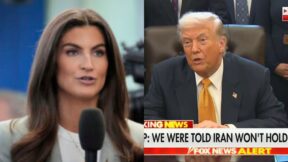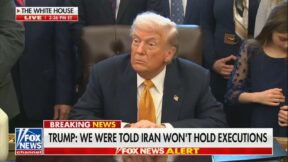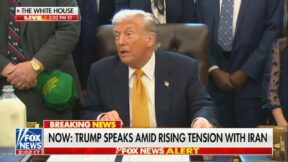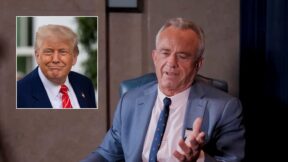‘It’s a Contradictory Message!’ CNN’s Jake Tapper Grills Kevin Hassett About Trump’s Administration’s Mixed Messages on Tariffs
CNN’s Jake Tapper grilled Kevin Hassett — the director of the National Economic Council — about the mixed messages coming out of the White House on tariffs.
In an interview on CNN’s State of the Union Sunday, Tapper argued that Commerce Secretary Howard Lutnick and U.S. trade representative Jamieson Greer were kept out of the loop on President Donald Trump’s walkback of the tariffs.
“Last Sunday, the Secretary of Commerce, Howard Lutnick, was on a different show,” Tapper said. “He was talking about tariffs. And he was saying that what these are going to do — it’s going to bring iPhone manufacturing to the United States. Five days ago, U.S. Trade Representative Jameson Greer told senators, ‘the president has been clear with me and with others that he does not intend to have exclusions and exemptions’ to these tariffs. But now we know about these carve outs for electronics imported to the U.S. that we talked about, you talked about at the top, smartphones, computers, chips. It’s a contradictory message! I mean, I understand that you’re saying that this was the plan, but it seems like nobody told Lutnick and Greer.”
Hassett argued that other media venues didn’t offer the Trump administration’s representatives adequate time to lay out the exact case.
“No, I disagree with that,” Hassett said. “I think that absolutely the characterization that I gave you at the top of the hour is the thing that everybody understood all along. But i can see that when you’re getting interviewed here, interviewed there, that somehow — like, not having the time with you and I have now [to] just show the big picture can make it so that people don’t have a complete picture of what’s going on.”
Tapper pointed out that Greer was afforded hours before Congress to spell it all out and then confronted Hassett about the implications of the newly-announced exemptions to the tariffs on some electronics imported from China.
“These exemptions are only for items that will help our Defense Department needs,” Tapper said. “It’s not iPhones in general? It’s not semiconductors in general for commercial use?”
“There’s a long list, which you could put a graphic up of the things that we’re planning 232 actions on,” Hassett responded. “Because they’re necessary for national security, and those things that are on that long list are things that will be exempt until those 232’s happen.”
“But you understand how some people might look at this and say, ‘this doesn’t really make sense in terms of the president’s larger goal,'” Tapper said, pressing. “If the president Trump and you and your team are all trying to reshore manufacturing so that American manufacturing for phones and computers is happening here in the United States and along with all these great middle-class jobs that would go with it, that you’re exempting those items. While at the same time, the re-shoring and manufacturing of the production of sneakers and t-shirts would happen here. And that seems to be completely the opposite of the goal, right?”
“That’s just a perspective,” Hassett replied. “If you think that we’re going to fail to deliver on the 232’s, then your question would be one to wonder about. But the 232’s will be successful. We’ve already got 232 steel and aluminum, for example, and so that would be covered by the reciprocal part. And we’ve got 232 on autos, that’s not covered by the reciprocal part. So those other things are going to happen. And it makes a great deal of sense.”
Watch above, via CNN.





Comments
↓ Scroll down for comments ↓